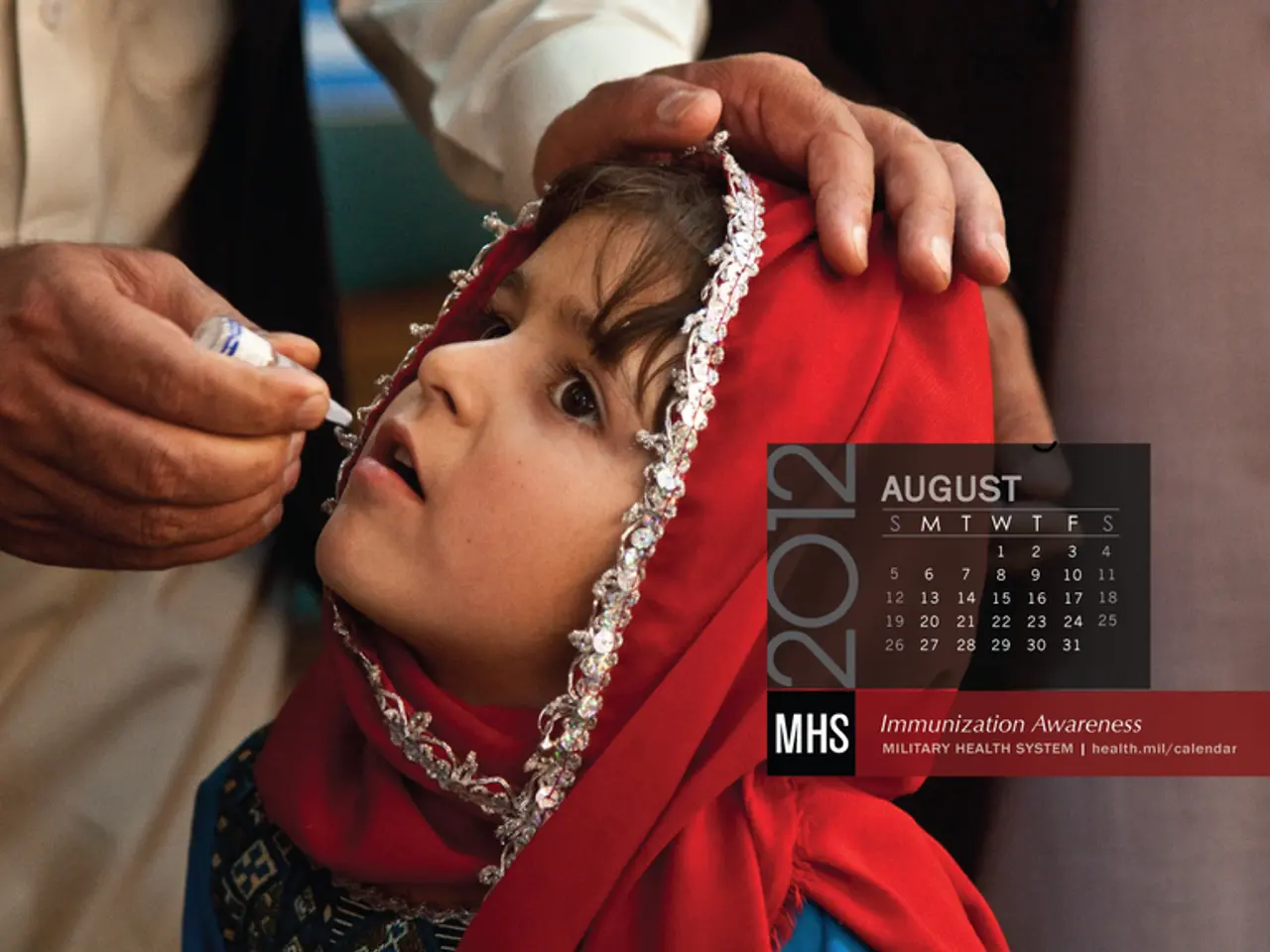COVID-19 Complications and Acute Myeloid Leukemia: A Comprehensive Overview
Acute Myeloid Leukemia (AML) patients are at a higher risk of severe illness and complications from COVID-19 due to the effects of the condition and its treatments. However, COVID-19 vaccines are generally safe for immunocompromised patients, including those with AML[1].
The vaccines currently authorized for use are non-live vaccines (mRNA or protein-based), which are considered safe for AML patients. However, immune responses in AML patients might be less robust, so multiple vaccine doses or booster shots may be recommended following official guidelines to maintain immunity[1].
Timing of vaccination is crucial. If AML patients are undergoing intensive chemotherapy or have severely weakened immunity, vaccination might be delayed until some immune recovery is achievable, as advised by the treating oncologist[1]. Shared decision-making with healthcare providers is essential.
Family members and caregivers of AML patients are also strongly encouraged to get vaccinated to reduce the risk of virus transmission[1].
There are no specific contraindications or unique risks reported for COVID-19 vaccination in AML patients, as the vaccines do not contain live virus[1]. However, drug interactions relevant to AML treatment and COVID-19 vaccines should be checked[4].
Monitoring for side effects should be attentive, given AML patients’ vulnerability and potential therapy-related risks.
AML patients should take extra precautions against infection, including wearing a tightly fitted face mask, maintaining social distancing, avoiding crowds and poorly ventilated locations, washing hands and surfaces regularly, covering coughs and sneezes with an elbow, staying up to date on local COVID-19 guidance, checking for COVID-19 symptoms regularly, and reading a visual guide to proper hand-washing.
Treatments for AML can lower the number of blood cells in the body, increasing the risk of complications from COVID-19. The American Society of Hematology advises that giving chemotherapy to a person with COVID-19 can carry some risks, as the chemotherapy may interact negatively with the COVID-19 treatment the person is receiving[2].
AML can quickly spread to other body parts, such as the liver or central nervous system. AML usually develops from cells that would have turned into white blood cells. There are various treatments for most people with AML, including chemotherapy, radiation therapy, chemotherapy with stem cell transplant, and other drug therapies[3].
Chemotherapy for AML can reduce the number of neutrophils in the blood, making the immune system less effective at fighting infections. AML is the most common form of leukemia in adults.
People with AML could experience more intense COVID-19 symptoms than people without AML. There is currently no evidence to suggest that one type of COVID-19 vaccine is safer or more effective than another in people with AML, as none of the current vaccines are live attenuated vaccines[1].
People with AML who are receiving treatment should continue attending appointments unless advised otherwise, but should discuss the risks of visiting a clinic with their doctor before each appointment. AML treatments can weaken the immune system, and doctors may suggest that some people with AML wait for their immune system to strengthen before they get the vaccine[1].
The CDC recommends that people who are not fully vaccinated wear cloth face masks in indoor public settings, and that surgical masks and N95 respirators are reserved for healthcare workers. People with blood cancers have an even higher risk of prolonged infections and death from COVID-19 than people with solid tumors[5]. In 2020, AML caused around 11,180 deaths in the United States[6].
In conclusion, COVID-19 vaccination is recommended for AML patients with the precaution of coordinating with their oncology team regarding optimal timing and considering their immune status[1]. Keeping close contact with healthcare providers ensures the best vaccination strategy tailored to their disease status and treatment.
[1] National Cancer Institute [2] American Society of Hematology [3] Leukemia & Lymphoma Society [4] American Society of Clinical Oncology [5] Blood Cancer UK [6] American Cancer Society
- For AML patients with COVID-19, chemotherapy could carry risks, as it may interact negatively with the COVID-19 treatment they're receiving, according to the American Society of Hematology.
- Given their susceptibility and therapy-related risks, monitoring for side effects after COVID-19 vaccination should be attentive for AML patients.
- Despite the increased risk of complications from COVID-19, the vaccines currently authorized for use are generally safe for immunocompromised AML patients.
- AML patients, along with their family members and caregivers, are strongly encouraged to get vaccinated to reduce the risk of virus transmission.
- The non-live vaccines (mRNA or protein-based) currently utilized might not induce a robust immune response in AML patients, necessitating multiple doses or booster shots to maintain immunity.
- As reported by the American Society of Clinical Oncology, it's important to check for drug interactions relevant to AML treatment and COVID-19 vaccines before administration.
- Given that people with AML could experience more intense COVID-19 symptoms than those without AML, it's recommended that they take extra precautions against infection, including wearing a face mask, maintaining social distancing, and adhering to local COVID-19 guidance.




